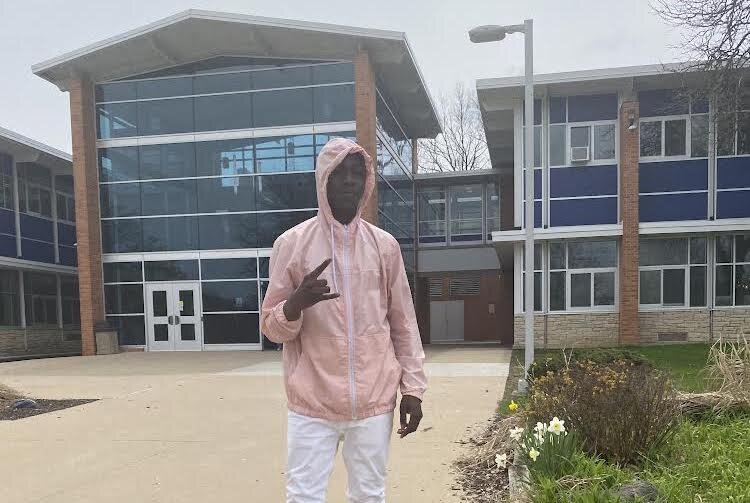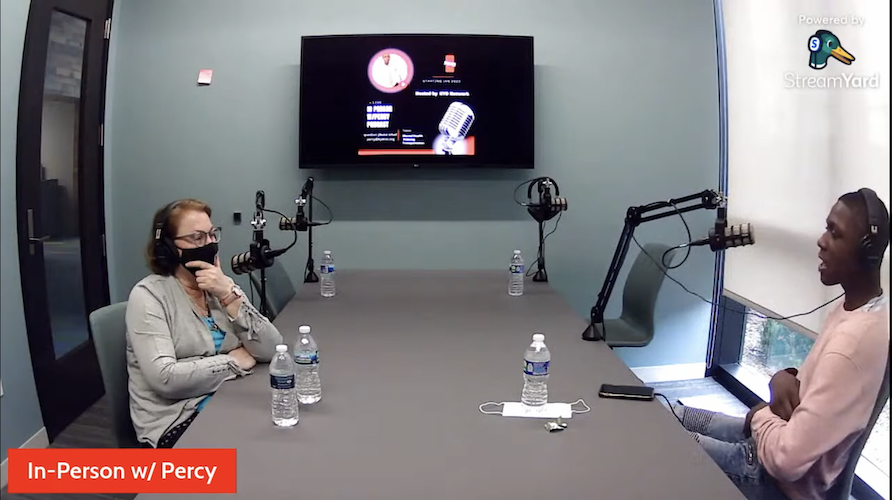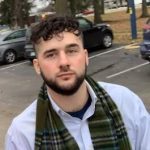Voices of Youth — Teen podcaster: ‘If I don’t speak out, who will?’
“Violence, academics, sports,” are the most important issues facing youth today, says Percy Gordon, adding that youth don’t intend on choosing violence first. “Violence is a mechanism of people, how we were raised. Violence is everywhere.”
The Voices of Youth program is a collaboration between Southwest Michigan Second Wave and KYD Network, underwritten by the Stryker Johnston Foundation. Enrollment is now being accepted for the fall Voices of Youth classes.
I stood there for a few minutes at a KYD Network event, unsure where I was supposed to sit. Then, a nice surprise happened. Percy Gordon, a 17-year-old rising senior at Kalamazoo’s Loy Norrix High School, walked up and introduced himself. It was impressive that a young person would go out of his way to make me, an adult guest, feel welcome.
The event took place in April at Pretty Lake Camp in Mattawan, Michigan. It drew about 100 or so high-school-aged teenagers, including Gordon and Briiz Jean-Baptiste Vicioso, both of whom I was able to interview. The teens were broken into focus groups to talk about various topics that can adversely affect youth in Kalamazoo, such as mental health, policing, transportation and in-school violence. Each group was youth-led and youth-facilitated.
Gordon has been a part of KYD Network’s out-of-school programming for some time, and worked for the nonprofit over the summer as a junior out-of-school time coach, a paid job. Gordon also records his podcast “In Person With Percy,” which was what he told me about right after introducing himself when I first met him.
When I spoke with Gordon via Zoom in June, he commented on how busy he has been with various projects, even though high school was then on break. I had a chance to listen to several of his podcasts available online through the KYD Network YouTube page. Gordon said he uses his platform to talk about issues important to him and his peers. His April 18, 2022 episode, for instance, focused primarily on how Gordon believes Loy Norrix should better teach him skills necessary for adult life.
Below are excerpts from my interview with Percy Gordon, with commentary from Briiz Jean-Baptiste Vicioso, 18, a recent Loy Norrix graduate, and KYD Network Director Meg Blinkiewicz. KYD Network provides out-of-school programming for Kalamazoo County’s youth.
What made you want to start filming a show?
“It was my idea,” Gordon said. He explained that the virtual learning that the pandemic required for 18 months had put a lot of strain on him. He said he needs in-person learning, and an opportunity to share his thoughts. He said his friends feel similarly. “Percy’s voice has to be heard. If I don’t speak out then who will?”
Also, with the various racial justice events and rallies that spread across the country in 2020, Gordon said there was further strain on him to be vocal as a young Black male. Gordon said he felt like his voice was not being heard. Gordon believes that most youth voices were not heard at the beginning of the pandemic.
Gordon said that a lot of youth that he knows did not score as high on tests as they wanted to when schools were under lockdown. Without the accountability of in-person learning, he said, many students fell behind. Gordon understands that it was a serious pandemic, but he thinks it was inconsiderate of the schools to not listen to the youth who said they needed something more than virtual learning alone.
At a KYD Network event in 2021, Gordon approached Director Meg Blinkiewicz about starting a podcast. Blinkiewicz said the two were driving through Kalamazoo and that this is typically “when he comes up with all his brilliant ideas.” Blinkiewicz said she sees her role as “opening the doors, and making the connections.”
She helps youth bring their ideas to life. Once The Kalamazoo Promise went through a staffing transition in their new facility and were able to start in-person work, the podcast started spring 2022 in their brand-new podcast filming room.
What are the most important issues facing youth in Kalamazoo today?
“Violence, academics, sports,” said Gordon, without missing a beat. “Us youth don’t intend on choosing violence first. Violence is a mechanism of people, how we were raised. Violence is everywhere.” Gordon said the issue is that people are taught to choose violence over other options.
Do you think it is important for adults to listen to youth when it comes to creating a framework around youth education?
Gordon: “If you don’t want fights in this building, if you want a smooth day, you need to listen to us youth. (Educators) need to listen to us. We go through it, not y’all.” He pointed to the early start of the school day as one concern. Because of it, “in order for us to do the work, we need break time. Lunch is from 11:19 a.m. to 11:49 a.m. That is not enough. And I shouldn’t have to ask to go to the bathroom.”
Gordon’s episode concerning what is taught in high school versus what skills youth need shined a light on what he considers to be a disconnect between what skills young folks need versus what they are taught in school. I asked Briiz Vicioso, another KYD Network student, for their thoughts.
Do you feel that in your high school career, that you were taught things that helped prepare you for the real world?
Vicioso said they received such training but that was “only because I took classes that could directly apply to my adulthood.” Vicioso explained that general education classes are not as relatable. Gordon agreed: “EFP (Education For Employment) should be the whole high school career because, if you don’t have money, what are you?”
Vicioso was able to choose college classes that were specific to them, including majoring in graphic design. In addition to general ed classes, they took courses that taught them how to be a graphic designer, learn about Adobe Cloud, make invoices, and more.
Do you feel like parents should be more responsible for teaching children things about the life outside of high school?
Vicioso: “Yes. There is a split. One value that my mother has always shared with me is that it takes a village. It takes a village to raise youth. I am a village child.” Vicioso called it “mutual accountability” between parents and educators.
Gordon is in the middle with this. “Parents should be a small percentage of life education, but at school we are there to learn and there are teachers that are certified in specific topics,” he said. Gordon and Vicioso both spoke of how important it is for adults to listen to youth.
How should conflict with youth be addressed?
I asked KYD Network Director Meg Blinkiewicz how her organization approaches conflict with youth. “When there are two or more young people involved in a conflict, youth engage in the conversation and adults do very little talking. Young people typically come up with the solution themselves. When a conflict arises, we engage youth in critical thinking,” Blinkiewicz said.
How long is Percy Gordon’s podcast going to run?
“There is no plan. There can be a million episodes you never know,” Gordon said.
Check out Gordon’s “In Person With Percy” podcast here.
Casey Grooten was the art mentor for the 2022 Voices of Youth Kalamazoo program that took place in April and May.

















